
As international student mobility has grown, education agents have become an important part of the overall recruitment landscape, with language schools, universities, and even some community colleges and K-12 schools all increasingly making use of their services.
Agencies can provide an important service for schools, giving them a presence on the ground and specialized market knowledge in strategically important countries and regions.
In an increasingly competitive market, however, the traditional agent-student recruitment model cannot always provide the diverse lead generation approach many schools require. This is where digital marketing can be a valuable supplemental tool, allowing schools to augment their existing agency relationships with a wide-reaching online strategy that raises international awareness of their brand.
The end result is a more fluid, dynamic recruitment model that can result in both increased business through your international agents and a steady stream of direct inquiries through digital channels.
The Current Role of Agencies in International Student Recruitment
The prevalence and influence of education agents can vary greatly from country to country. Australia, for instance, was one of the earliest adopters of the agent-student recruitment model, which has been fundamental in establishing the country as a leading international student destination. By 2014, figures from the Australian Universities International Director’s Forum (AUIDF) estimated that as many as 62.1% of university level students in the country had come through agencies.
Institutions in other major markets like Canada and the UK also have long-established relationships with agents. Times Higher Education reported in 2015 that all but 19 of 158 higher education institutions in the UK used agents to recruit non-EU students, while statistics from the Council of Ministers in Education, Canada (CMEC) in 2014 indicate that approximately 78% of all education institutions in the country use agents.
In the USA, where commission-based recruitment of domestic students is illegal, adoption has been far slower. However, after the National Association for College Admission Counseling (NASAC) lifted a ban on commission-based international recruitment in 2013, many more American institutions began using them. In 2017, 38.5 percent of higher education institutions reported that they used agents.
The use of agents can also depend on institution type. Language schools in particular have always relied heavily on their services, with many using them as their primary method of recruiting students. And while universities tend to utilize a more diverse range of channels in their efforts, agents have remained a large part of their activities.
Institutions that have traditionally had more of a domestic focus, such as community colleges and K-12 schools, tend to have less of an established practice of using agents. Even in these sectors, however, the movement towards more internationalized recruitment has meant agents have slowly begun to gain a foothold in the industry.
Example: Private K-12 schools which take in a lot of international students, such as St. David’s Catholic Sixth Form College in Wales, often use education agents for certain countries.

Expanding the Reach of Your International Student Recruitment Strategy
A good agency can play an important role in your international student recruitment strategy, acting as an ambassador for your school in their home country, meeting with students, and delivering a healthy return of qualified applicants.
However, there can be a danger in becoming overly dependent on a small number of agents in specific markets. Often, an institution that develops a good relationship with an agent in a particular region or country will end up relying on them to provide a large proportion of their international enrollments.
This can leave them vulnerable to economic and political instability, as changes in a country’s market or political landscape may result in a drop in demand for international study. For example, the heightened geopolitical rivalry between the US and China – America’s largest international student demographic – in recent years has impacted international student numbers at US universities. A recent Associated Press article reported that a number of US universities had experienced a decline in enrollment numbers from Chinese students in the Fall of 2019, with many citing the current political climate as a contributing factor.
Digital marketing can provide a valuable supplemental international recruitment service to help schools to mitigate this issue. By offering an outlet that can be utilized globally, it allows institutions to expand the reach of their lead generation efforts into markets where they may not have an established agency presence. This will help ensure that you have a wide range of recruitment sources to draw upon in the event of any unexpected market fluctuations.
A more multinational recruitment policy will also help ensure that you cultivate a diverse student base, which can be particularly important for sectors such as language schools, where students expect and often prefer to mix with students from a range of backgrounds.
Promoting Your School in New International Student Markets and Regions
Recruitment agents can also be particularly valuable for improving brand visibility. In crucial markets such as China and South America, only a few world-renowned institutions like Harvard and Oxford really enjoy widespread brand recognition. Agents can help you get your name out there, introducing your school to prospective students and selling them on its credentials and reputation.
Example: In 2013, marketing agency Intead analyzed data from IIE Open Doors Reports over the previous three years, comparing the growth in international student recruitment between members of the American International Recruitment Council (AIRC), which sets standards for agent services and practices in the USA, and other universities. They found that AIRC members enjoyed an average growth rate of 15.6% compared to 13.8% for non-members, despite often enjoying much less global brand recognition. Below you can see the top 20 AIRC members between 2009 and 2012:

Meanwhile, the top 20 schools overall experienced similar levels of growth, despite including globally renowned institutions such as NYU and Berkeley:

Example: Language Studies International, a leading ESL provider with locations in several countries, has cultivated over 26,000 followers from all over the world on Instagram.
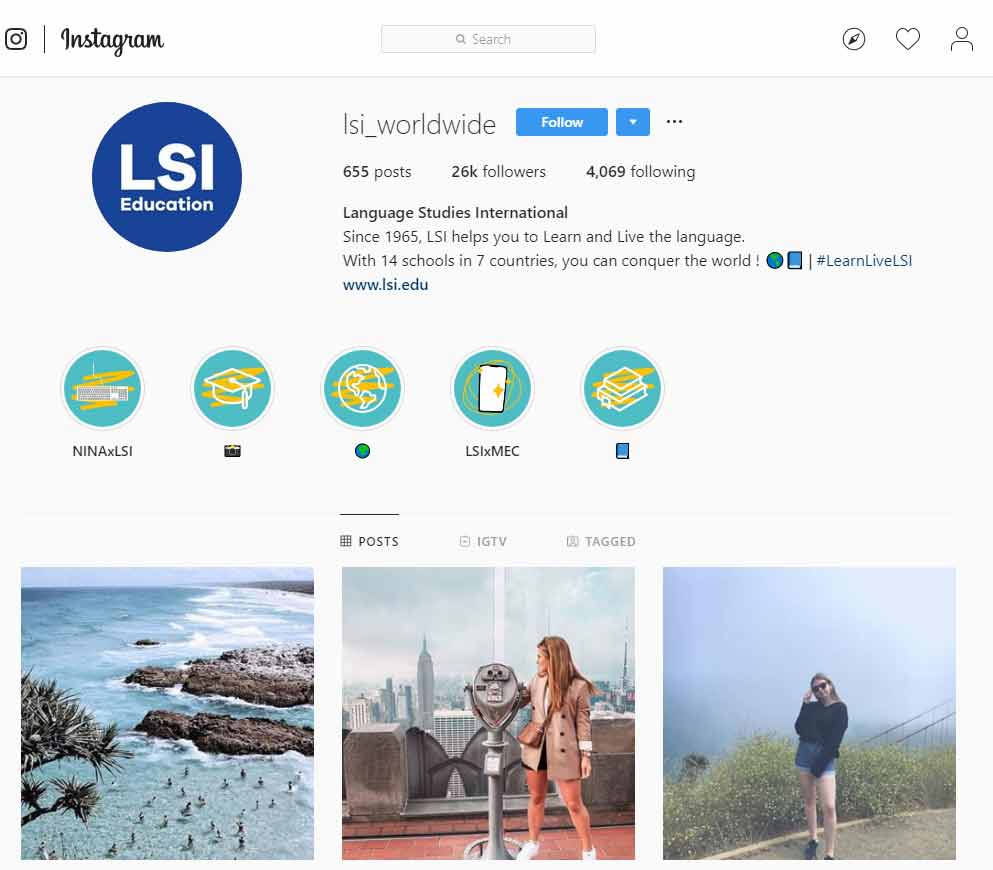
The school’s active social media presence not only helps it attract more inquiries, but its wide reach helps ensure a diverse mix of nationalities, which LSI highlight on their website:
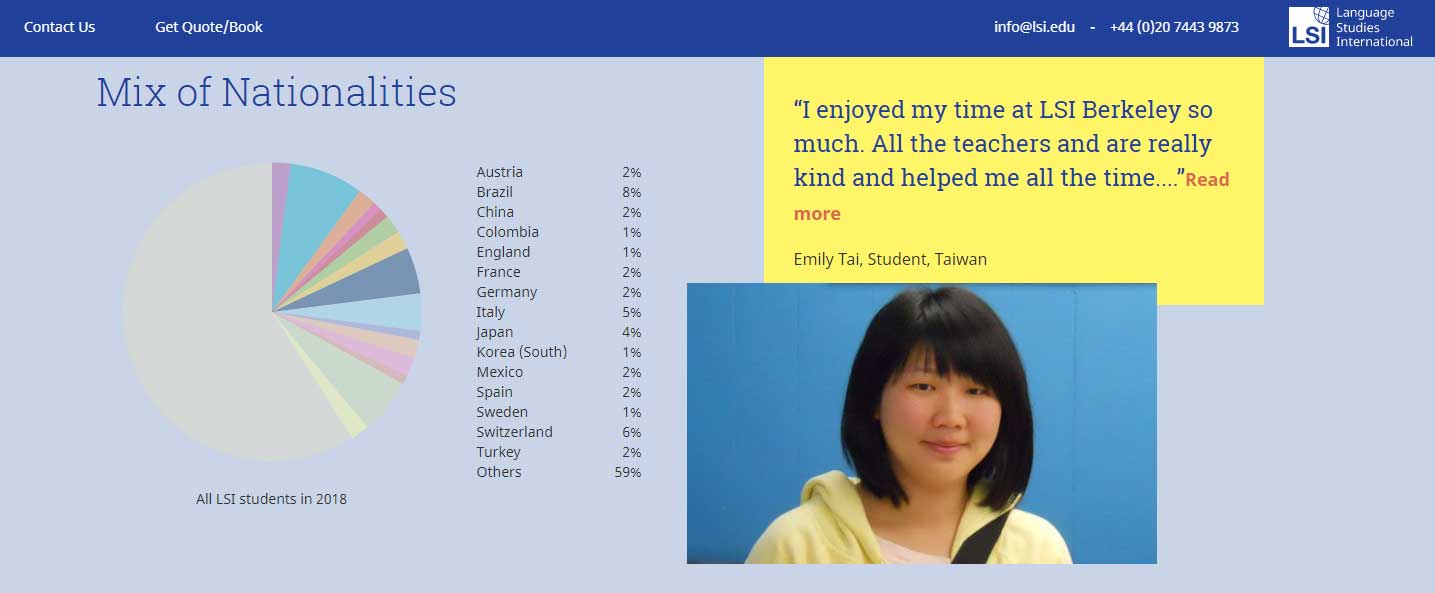
Ensuring Accurate Representation in International Recruitment Markets
Many agencies will take great care to learn as much as they can about your school, its facilities, and location, sometimes even visiting it in order to get a clearer picture of what you offer.
However, keeping agents on the other side of the world updated with all the happenings at your school can be a challenge, especially for international student recruitment departments with limited resources. A recent joint report released by Intead and the AIRC entitled Agent-University Partnerships: The State of the Field 2018 found that and just 62% of agents and less than half of universities said they communicated with agents on a daily or weekly basis:
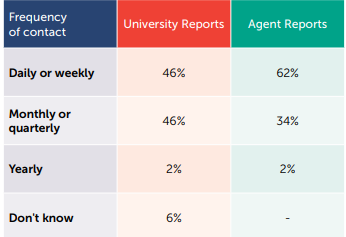
This disconnect can mean there is always a danger that the information prospective students receive about your school can be diluted, outdated, or simply lost in translation. In turn, this can lead to students being dissatisfied once they arrive at your school if it doesn’t live up to their expectations.
For example, institutions in Canada and the more northern parts of the United States often experience difficulty with international students who were not prepared for the colder winter temperatures these areas experience. Other institutions might experience situations where students were misinformed about accommodation, or class sizes, or the amenities in the local area.
While this is unintentional, it can have an impact on your student retention rates and harm your overall international reputation, with negative reviews impacting the amount of leads you can generate through word-of-mouth. It can also lead to increased administrative costs, as your staff spends an inordinate amount of time dealing with unhappy students.
A comprehensive digital marketing strategy can give your staff more control of your message in international markets. Your website and social media content can serve as a valuable reference point for both students and agents themselves, allowing them to access accurate, up-to-date information about your location, facilities, and programs to quickly clear up any misconceptions.
Example: This video from ILSC Vancouver is a great example of why digital marketing can be the best way to paint a clear picture of what students can expect at your school. Using the voices of current students to make their message more relatable, the school perfectly illustrates the climate, atmosphere, and facilities for international students available in the city.

Through informative content, your school can ensure that you only attract prospects who are a good fit for what your school has to offer.
Following Up on Direct Inquiries and Applications from International Students
One challenge schools face when they introduce digital marketing into their international recruitment mix is dealing with direct inquiries. A good agent will typically manage a large part of the inquiry process themselves, usually turning it over to your school only at the point where a student has completed an application form.
Digital marketing, on the other hand, generates both inquiries and applications. This means that prospective students will be in direct contact with your institution at every stage of the enrollment journey, and you need to be prepared to follow up with them by phone, email, SMS, and even social media channels.
This may involve employing staff who can answer inquires in a student’s native language, which creates an additional expense. Even if you already have those staff members in place at your school, the amount of new inquiries they will be dealing with will significantly increase their workload.
Example: Below is an illustration of a typical lead follow-up process. As you can see, your school can expect to be in frequent contact with prospects over a long period of time as you nurture them towards conversion.

While this can be a definite negative of generating more direct inquiries, it is not an insurmountable obstacle. CRM and marketing automation technology can go a long way towards helping you streamline your follow-up processes, allowing you to segment and track the progress of individual leads, schedule calls, and even develop automated email and SMS for different stages of the enrollment journey.
You can specifically tailor your CRM for this purpose, making it easy to develop a lead follow-up framework that fits your school’s unique needs. A good CRM platform will also provide you with extensive reports that will allow you to track the progress of both leads and applications by location, recruitment source, and a range of other parameters.
This means you can measure the success of both your agency activities and your direct marketing efforts, allowing you to refine and improve your overall strategy and ensure your initiatives complement each other effectively.
Example: This report page from HEM’s customized Mautic CRM system for schools gives an overview of leads generated for a language school by program, channel, and location.
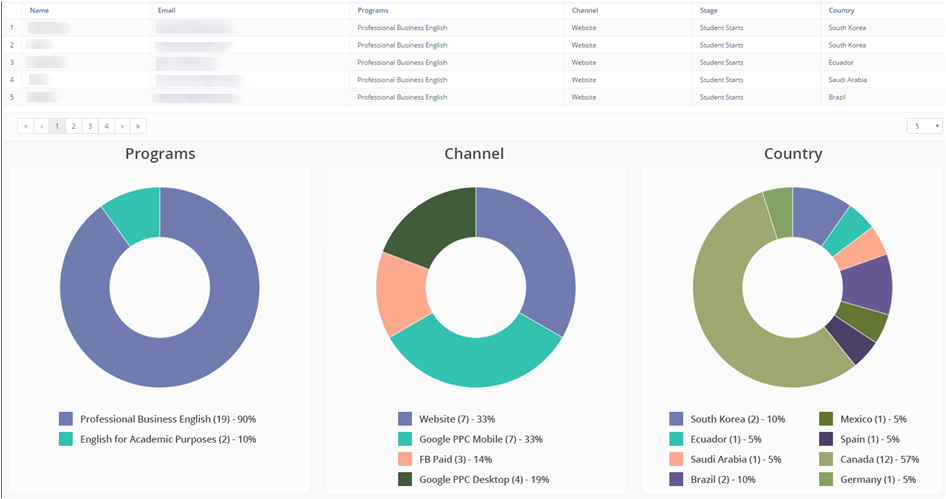
The platform also allows schools to create and manage agent and agency contacts through the system, and track which specific leads are associated with them.
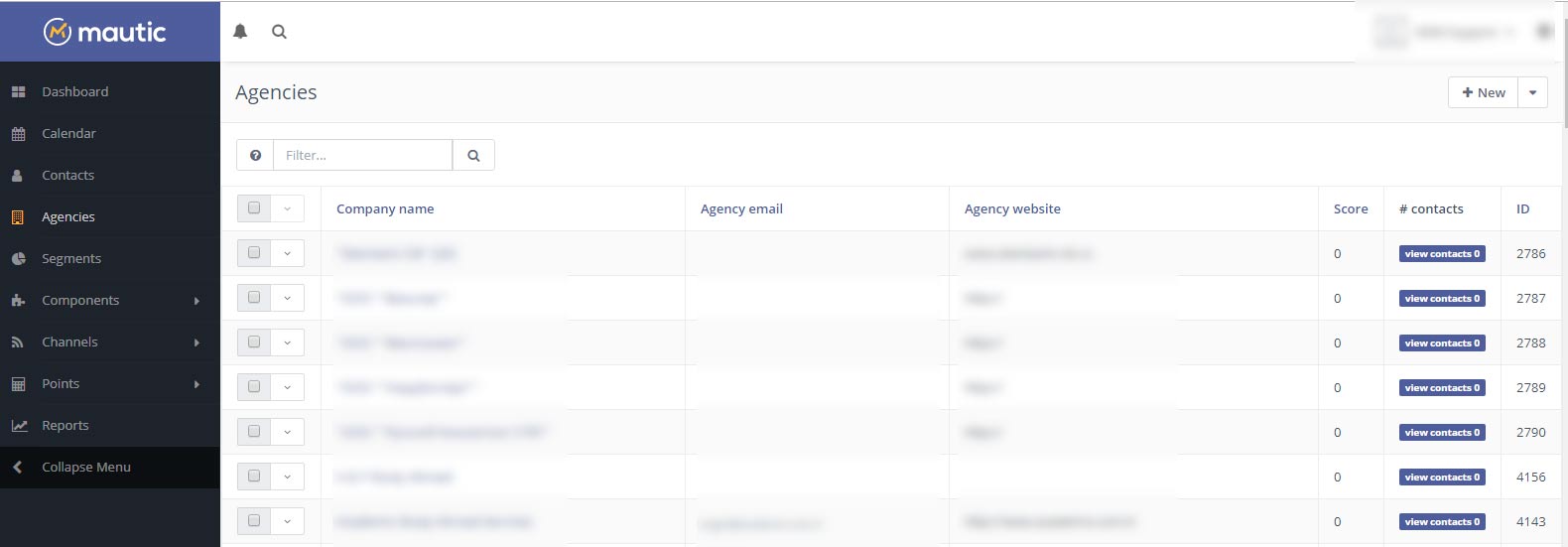
This means you can measure the success of both your agency activities and your direct marketing efforts in your CRM, allowing you to refine and improve your overall strategy and ensure your initiatives complement each other effectively.
Digital tools can also come into play at the Application Stage. HEM’s custom-built Application Portal, for instance, enables agents and agencies to create unique accounts, through which they can submit applications on behalf of students to multiple campuses.
Example: Agents and agencies can create unique accounts on HEM’s application portal that can be used to track their monthly submissions, make a booking for a student, coordinate payments, or upload documentation.
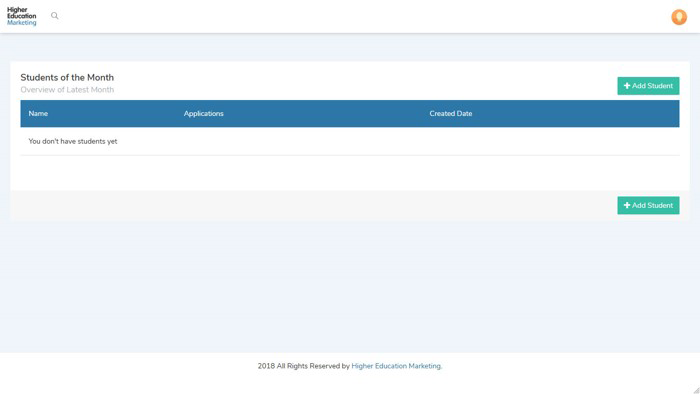
Personalizing Your Online Follow-Up for International Students
One of the biggest advantages of agencies is that they offer schools without the resources to physically send recruitment staff to their target countries and regions a physical presence on the ground. Once you start generating more direct inquiries online, however, this personal, direct contact with students can be hard for schools to replicate, although it is getting easier.
Social media, for instance, can be a great way to encourage informal engagement and interaction with students from anywhere in the world, as can your blog and other parts of your website. Instant messaging is also rapidly becoming a valuable component of many student recruitment services, with schools at all levels finding success by encouraging students to contact them personally and directly on apps like WhatsApp, Messenger, and even WeChat in China.
Example: The University of Canterbury in New Zealand directs students to its WeChat profile from its website. The popular messaging app is the ideal way to get in touch with Chinese students online.

The big advantage of these channels is that students are communicating directly with your school, rather than an intermediary, meaning you can offer advice and information that agencies might find difficult to answer, such as specific queries about programs, accommodation, or other facilities at your school. Your staff can easily access this information and provide students with a quick response, immediately creating a positive impression.
Example: The University of British Columbia responds directly to international student queries on Twitter.
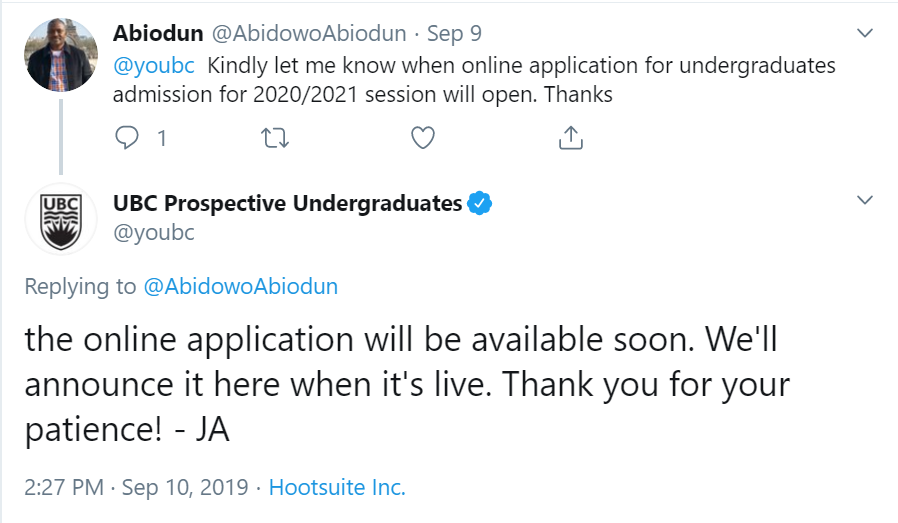
Of course, there are still some drawbacks. One major issue is that, while agents have firsthand experience of the cultural norms and expectations of the region they operate in, your staff may not have that experience, making it harder to make meaningful connections with new leads.
Agents also offer prospective students the option of communicating with a representative of your school in their native language, and you may need to hire native speakers to offer Skype sessions and emails to students in order to connect with them effectively.
The Role of Persona Development in Direct Recruitment
Developing detailed, actionable student personas is a crucial part of international student recruitment, but it can be even more important when you are dealing with direct inquiries. Persona development is a market segmentation technique in which recruitment professionals use the most common attributes of their prospective students to create a detailed picture of a typical lead.

Getting this process right can be crucial in helping you figure out where to reach international students online, and how and when to engage with them effectively. Here are a few tips for researching personas that will help you ensure they are as accurate as possible:
- Survey your admissions & recruitment team for their insights.
- Survey or poll your students & alumni directly.
- Use journey-mapping to track key touchpoints in the decision-making process and determine how best to contact prospective students at each of these stages.
- Conduct market research to better understand what is impacting decision-making among prospective students in your key target markets.
- Discuss your personas with your agents for their insights into your target market.
Finding out exactly what the common backgrounds, goals, and challenges your students face will allow you tailor your content, campaigns, and contact options specifically for their needs. This will help you deliver online recruitment services that feel just as personal and accessible as a face-to-face meeting.
Finding the Right Student Recruitment Mix for Your School
Whether you are generating leads through agents or online through digital marketing, it’s important to remember that there are no quick fixes. Both avenues require significant investment, and it can take time to see results. Even the best digital marketing strategy can take a while to really make an impact, just as good relationships with agents can take years to establish and cultivate.
Above all else, the extent to which you can use digital marketing to supplement the use of agents will depend on the preferences of the students you are trying to target. For instance, a 2014 report from The Observatory of Borderless Higher Education revealed that 45% of students from China, 43% from India, and 30% from Nigeria have used or intended to use agents to assist them in applying to study abroad.
This suggests that a strong agency presence is vital in all of these markets, but that a large proportion of students may also be looking for schools online. Preferences are likely to vary from region to region, and you may need to do extensive research to find the right mix.
Nonetheless, digital marketing gives you plenty of options, and you can continue to refine and improve your strategy over time to get the best results. And once you begin to attract leads through a more diverse range of sources, your international student recruitment strategy will become more efficient, cost-effective, and reliable than ever before.








